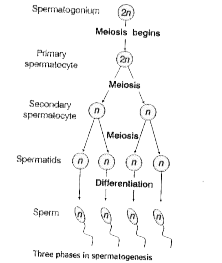Illustrate in detail the process of spermatogenesis in human.Solution in Odia
Spermatogenesis is the formation of spermatozoa which originate from the Primordial Germ Cells (PGC). The germ cells that migrate from the yolk sac to the testes during early embryonic development become spermatogenic stem cells called as spermatogonia within the outer region of the seminiferous tubules.

Spermatogenesis is completed in three major steps namely spermatocytogenesis, meiosis and spermiogenesis.
These are as follows
Spermatocytogenesis Al sexual maturity, spermatogonial cells divide several times by mitosis to produce a large number of spermatogonia. Some of them continue as stem cells or type A spermatogonia. Others differentiate into progenitor cells or type B spermatogonia.
These type B spermatogonia undergo changes by accumulating nourishing materials obtained from the germinal cells and become almost double in volume. This growth requires synthetic activities that are preparatory for the initiation of meiosis. Such cells are called primary spermatocytes.
(in) Meiosis The primary spermatocyte enters the prophase of the first meiotic division and pass through the stages of prophase, such as leptotene, zygotene, pachytene, diplolene and diakinesis.
The secondary spermatocytes undertake the meiosis 11 and produce the spermatids. In this way, from each of the type B spermatogonium, altogether 4 haploid spermatids are produced.
(iii) Spermiogenesis Each spermatid differentiates into a mature spermatozoan by the process of spermiogenesis. This includes the formation of acrosome, condensation and elongation of the nucleus, development of the flagellum and the loss of redundant substances of the cytoplasm and its organelles. After spermiogenesis, sperm heads become embedded in Sertoli cells and are finally released from the seminiferous tubule by the process called spermiation.
Topper's Solved these Questions
- CHSE ODISHA (EXAMINATION PAPER - 2019) BOOK - ARIHANT PUBLICATIONCHAPTER - CHSE ODISHA (EXAMINATION PAPER - 2019) EXERCISE - SECTION B (ZOOLOGY)
26 Videos
- BIODIVERSITY AND ITS CONSERVATIONBOOK - ARIHANT PUBLICATIONCHAPTER - BIODIVERSITY AND ITS CONSERVATIONEXERCISE - CHAPTER PRACTICE ( SHORT ANSWER TYPE- II QUESTIONS)
2 Videos
- ECOSYSTEMSBOOK - ARIHANT PUBLICATIONCHAPTER - ECOSYSTEMSEXERCISE - CHAPTER PRACTICE (Short Answer Type-II Questions)
2 Videos
Similar Questions
What is the name of the scientist who cloned a sheep named Dolly?
View SolutionGenetic diversity and Ecological diversity
View SolutionDefferentiate between the following Regulating services and supporting service of ecosystem
View Solution(a) Explain the process of spermatogenesis in humans.
View SolutionDescribe the T.S. of human testic and explain the process of spermatogenesis.
View SolutionWhat is spermatogenesis? Briefly describe the process of spermatogenesis.
View Solutionमनुष्य में लिंग निर्धारण की प्रक्रिया का सचित्र वर्णन कीजिए।
View SolutionWhat is spermatogenesis? Explain the process of spermatogenesis.
View Solutionआवृतबीजी पौधो में लघुबीजाणुजनन का सचित्र वर्णन कीजिए
View Solutionमानव में अण्डाणुजनन की प्रक्रिया का सचित्र वर्णन कीजिए तथा शुक्राणुजनन से इसकी तुलना कीजिए।
View SolutionWhat is spermatogenesis? Briefly describe the process of spermatogenesis.
View SolutionDescribe the process of spermatogenesis in human male.
View SolutionDefine spermatogenesis. Explain the process of spermatogenesis.
View Solution(a) Explain the process of spermatogenesis in humans.
View SolutionExplain the process of spermatogenesis in human being.
View SolutionWhat is spermatogenesis? Explain the process of spermatogenesis.
View Solution
